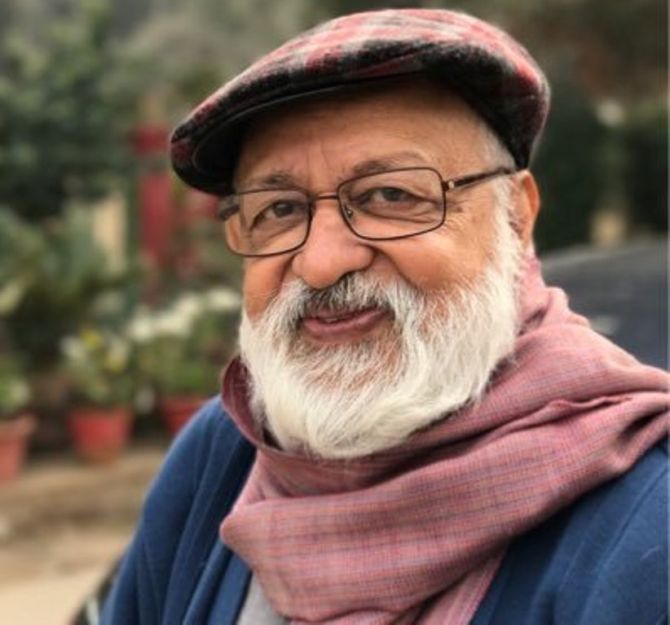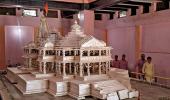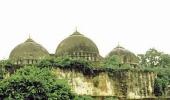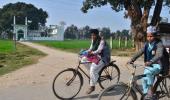From the kind of food to the art which will be displayed at the museum, historian Pushpesh Pant shares his vision with Syed Firdaus Ashraf/Rediff.com.

When Pushpesh Pant, historian and food critic, was invited to curate the new 'Babri Masjid' complex in Uttar Pradesh's Dhannipur village, the news came as a surprise to him.
The reason: He had neither applied for the job nor did he know any of the committee members of the Waqf board.
"I think one of my students must have recommended my name and that is how I got the job," Pant tells Rediff.com.
It was recently announced that the former Jawaharlal Nehru University professor was appointed as the curator of the proposed museum, library and community kitchen at the masjid complex in Dhannipur.
Asked about his vision for the complex, Pant says, "Of the five acres of the land allotted to the msjid complex, we have got 500 square yards for us. At present, we have thought to build a community kitchen, which will serve 365 varieties of vegetarian and non-vegetarian food from the Awadh region; each day there will be a new menu."
"This community kitchen will serve food for all the poor people who will come to the dispensary in the masjid complex -- which will be run free of cost."
He, however, clarifies that the food provided at the community kitchen will not be free of cost, and be nominally priced so that the poor could afford a meal.
Pant also plans to keep a lot of greenery inside the complex and also wants to build a verandah where worshippers can sit after prayers and take in the fresh air.
Besides that, he says, he plans to have a museum in the complex displaying Indo-Islamic art and photographs of different mosques in India.
"If you ask any Indian about the biggest mosque in India, the answer will be the Jama Masjid of Delhi. However, that is incorrect. The right answer is the Taj-ul-Masjid of Bhopal, and details such as this will be displayed in the museum."
An image of the Mishkal mosque in Kozhikode and regarded as an important cultural, historical and architectural monument of Kerala will also be displayed along with other prominent mosques of India right from Bijapur to Kashmir.
Pant has an interesting connection with Muslim culture, which dates back to the time of his maternal grandfather who served as the home minister of the Rampur estate; he was the lone Hindu minister of the nawab of Rampur.
"My maternal grandmother drew pension from the Rampur estate till the age of 91," laughs Pant, recalling his association.
He emphasises that he will seek help from his Muslim friends who are chefs, such as Mohammad Farooq, Osama Jalali and Imtiyaz Qureshi to decide the menu that will be served in the complex of the mosque.
Asked if the complex will draw in tourists, Pant responds, "It all depends on the government of Uttar Pradesh. They are surely going to promote the Ram Mandir as a tourism destination and if in the same way they promote the masjid at Dhannipur, then this place can become a popular tourist destination."
Asked about the opposition from some Hindus in Dhanipur who do not want the masjid to be built in their village, Pant says, "Let me counter this question of yours by asking you, even if this masjid is not built in Dhannipur, do you think communalism in India will get over? The answer is, no."
"Communal tension in India can rise for the silliest reasons. There are many ways to spread communal tensions in India and people do it when they want to gain something out of it."
Asked if the new masjid will be different from the Babri Masjid which was demolished in December 1992 and which for many Hindus had become a structure of hate, he asks, "How long are we going to treat a Muslim monument near a Hindu temple as a structure of hate? If we go on like this, there is no end to it."
"If you target the Gyanvyapi mosque in Benares, now the hate will continue forever. This hate process has to stop somewhere."
"One has to remember that there are 18 crore to 20 crore (180 million to 200 million) Muslims living in India. They did not choose Pakistan as their country. They live here and therefore I feel it is high time the dirt of communalism stops from spreading."
"Ganga-Jamuna tehzeeb is almost dead now," sighs Pant. "The Ganga river too has stopped flowing with full force thanks to the construction of the Tehri dam and the Yamuna river is so polluted that the less we talk about it the better."
The mosque that will come up in Dhannipur village pursuant to the Supreme Court verdict in the Ram Janambhoomi case will be of the same size as the Babri Masjid, says an office-bearer of the trust formed for its construction.
The five-acre complex in Ayodhya's Dhannipur village will also house a hospital, a library and a museum among others, the office-bearer says, adding that retired professor and noted food critic Pushpesh Pant will be the consultant curator for the museum.
The Uttar Pradesh Sunni Central Waqf Board has formed the Indo-Islamic Cultural Foundation, a trust, for the construction of the mosque on the five-acre plot.
Professor S M Akhtar of Jamia Millia Islamia will be the consultant architect for the project. The entire complex, says Professor Akhtar, head of the department of architecture at Jamia Millia Islamia, will "bring together the ethos of India and the spirit of Islam".
The Uttar Pradesh government allotted the five acre plot in Dhannipur village for the construction of the mosque on the Supreme Court directive.
After a protracted legal tussle, the Supreme Court had on November 9 last year ruled in favour of the construction of a Ram temple at the disputed site in Ayodhya, and directed the Centre to allot an alternative five acre plot to the Sunni Waqf Board to build a new mosque at a 'prominent' place in Ayodhya.










